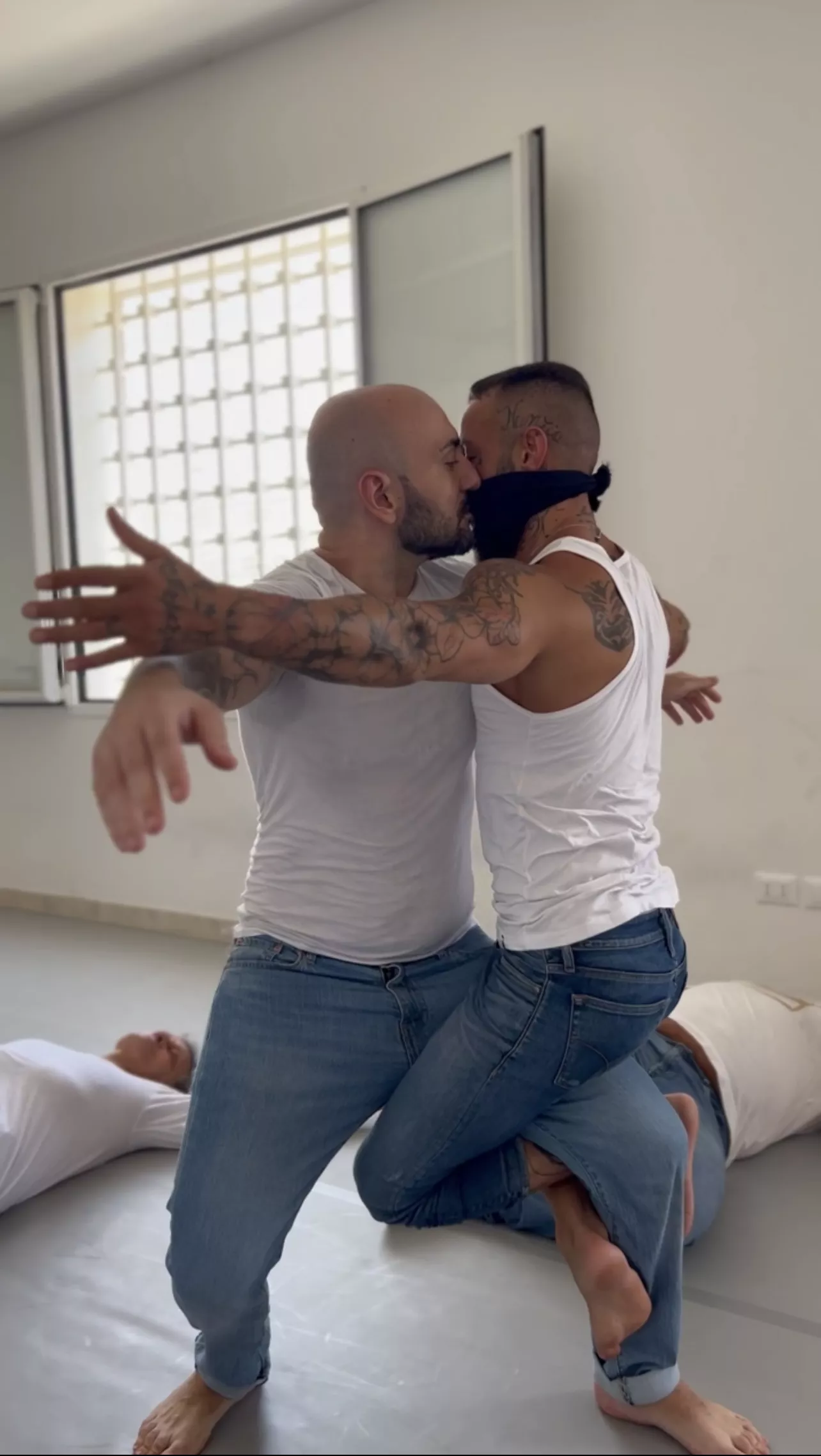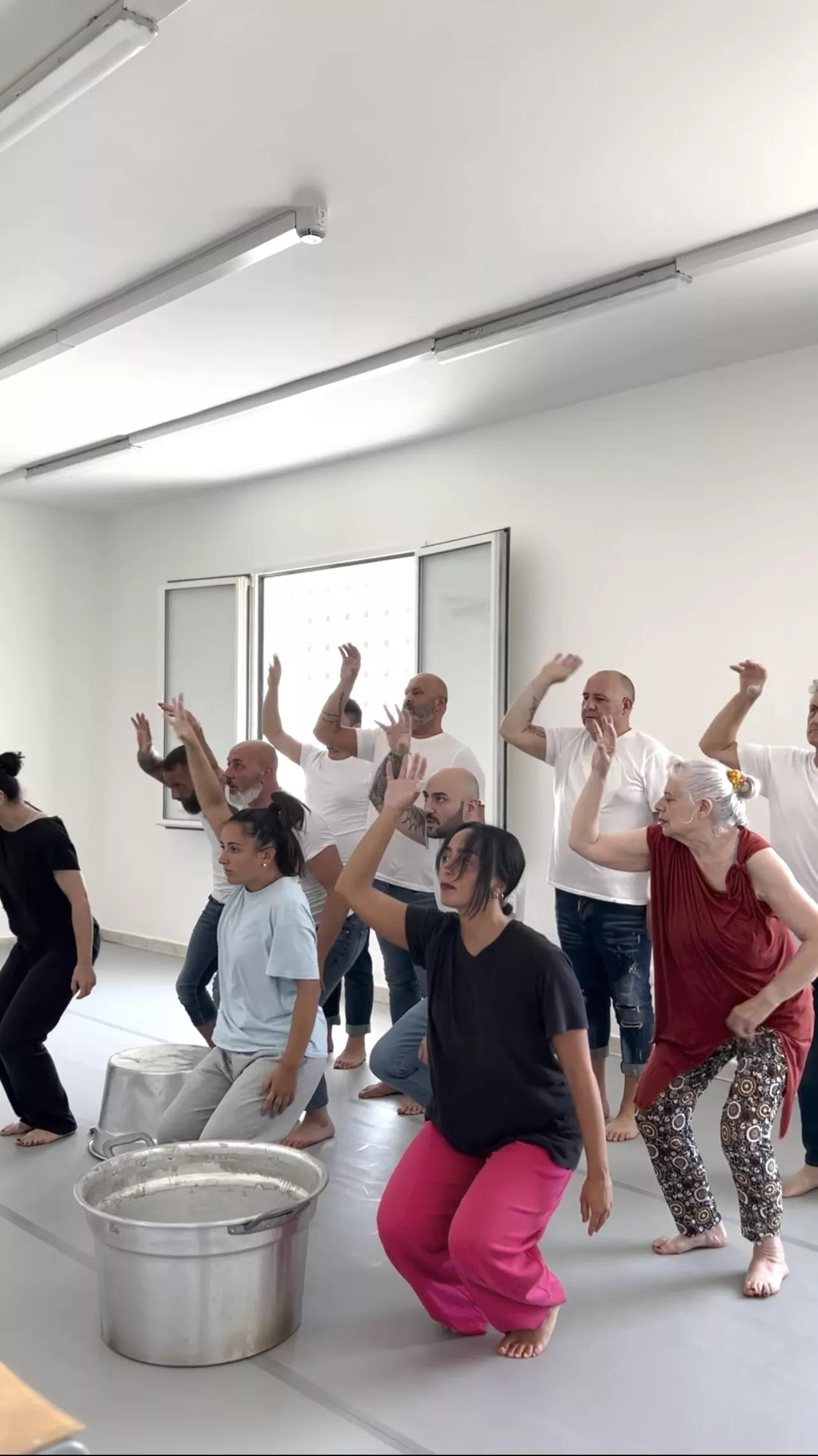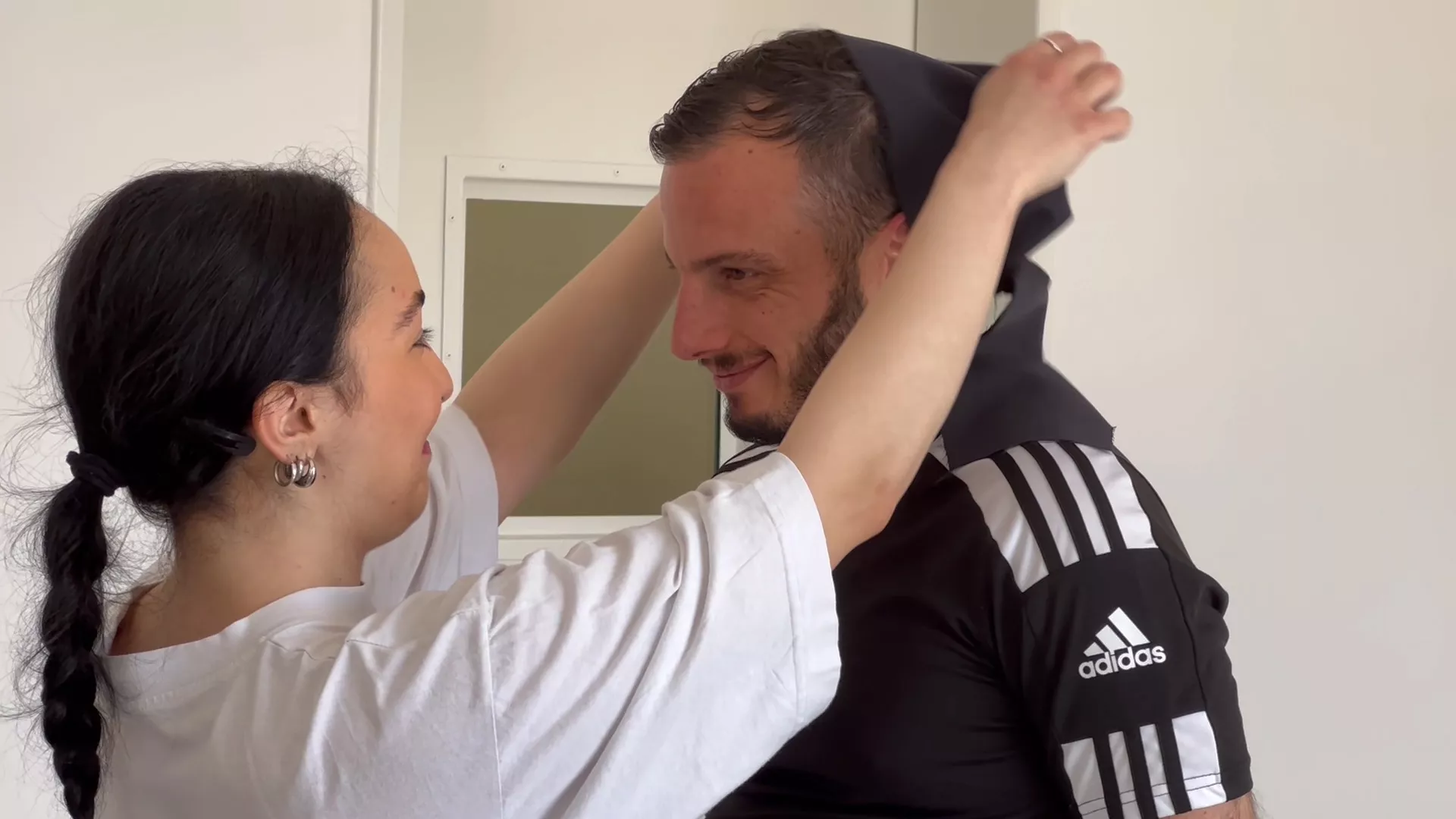Teaching Dance inside a Prison: An empowering opportunity for both Trainers and Learners
Can contemporary dance manage to infiltrate the bars of a male prison and release its full potential as a means of personal expression in complete freedom?

This was one of the challenges of the project IN SINCRO - International Training for Dancers and Social Innovation, a social innovation project co-funded by the National Agency Indire - Erasmus+ involving in partnership AlphaZTL Compagnia d'Arte Dinamica from Brindisi (IT) and FES Fundación Escuela de Solidaridad from Granada (ES). Both associations are active in the field of performing arts applied in social inclusion contexts.
The project consisted of training professional dancers and artists together with semi-professionals from disadvantaged backgrounds, both in Italy and Spain. We invite you to browse the project website for more details and to view the results:
https://www.alphaztl.com/en/art-and-social/erasmus/in-sincro
In this article, we analyse the impact that the training course in contemporary dance within the Brindisi prison (Italy) had on the prison's guest students and on the professional dancers and choreographers involved both as teachers and as trainees of the training, following a peer-to-peer approach in the relationship with non-professional colleagues.
IN SINCRO was born from a dream that required courage. To take contemporary dance away from the stages and cultural spaces that are traditionally destined to welcome it, and to make it reach the margins, in the Brindisi men's penitentiary. The protagonists of this experience were a group of 7 inmates, 5 professional Italian dancers/choreographers, 1 Spanish choreographer, 1 amateur dancer, 1 communication expert, 1 costume designer, who, together, tried to give shape and body to this dream, with great professionalism and an inspired sense of collaboration.
IN SINCRO wanted to create, in a place of detention, where art and culture are difficult to access, an unprecedented space for personal growth and artistic expression, unleashing the liberating potential of a language that needs no words, and which required each person to know and re-know themselves again starting from their own bodies.
Discovering together a new delicate alphabet made up of gestures, movements, and awareness of one's own body, and being able to share this experience in a group that was heterogeneous in terms of gender, age and life experiences, opened the doors to a new way of looking at oneself and narrating oneself, and enabled the participants to discover completely new and unknown aspects of themselves.
What dance can be useful for, in a place of detention, is told by the very words of the participants (teachers and trainees) in the answers given in the self-assessment questionnaires administered.
"Dance teaches whoever practises it what respect is for both one's own body and for the other, what trust is, how to let oneself calmly be in the hands of the other and be guided, the freedom to express oneself without even saying a single word, the passion that makes you happy, altruism, helping one's partner in time of need ... if all this is not educational!"
"[...] dance can also promote individual expression, because we all have the right to a second chance, this can be a way to redeem oneself"
"Dance, besides being a wonderful art, is education, it is discipline, it is respect not only for oneself but also for others. Everyone has the right to have a second chance and I believe that making art is a way to redeem oneself and express oneself one hundred per cent. I think dance is an art that belongs to everyone without distinction."
"Dance is able to bring bodies and minds of various kinds and entities closer together, bringing meaningful messages to society, without fear and without prejudice, with all the free expression that man can have"
There was unanimous agreement that the hours spent dancing and learning by sweating represented a moment for everyone to rediscover the taste of freedom, to 'fly closed in a cage', to feel catapulted into a universe of listening, trust and love.
"This was the best experience of my life, in the 5 hours I worked, I forgot I was in prison, I was treated very well and I did not suffer any prejudice"
"One day like this, by chance, I concentrated on looking closely at the teachers' eyes, their expression, their faces, and as if by magic I was able to read beyond what my sight was giving me. The perception was one of serenity, love, lightness, positivity and altruism. They took me to another dimension, to a world of colours, turning the darkness into a rosy grey. I hope one day I too will be able to find myself in those eyes, in that expression, in that face drawn by love, who find their great wealth in their selflessness".
"I carry with me the beauty of having met people who are in prison and who make you wonder why they are there, because in the end they are all like us and when you dance there is no difference, I carry with me their enthusiasm, their vitality, their joy of living, I carry with me the fact that they were waiting for that moment to taste freedom and seeing them happy made me happy too"
Dance entered the lives of the trainees in unexpected ways. Most of them had no familiarity with the language of dance, although there were some who secretly realised a childhood dream they had never really nurtured, namely that of dancing.
"I had never had the great fortune to attend dance classes but I can say that whenever I had the opportunity to watch television programmes related to dance, I was captured by their movements, their shapes, their lines and their expressions, making me live in that moment what they danced: joys, pain, anger, everything they represented [...] My future is not to be a dancer, I don't think so, it's a pity I'm not 20 years old anymore".
The group of students shared the same awareness of having to start from scratch, or almost...
"My starting condition was a combination of the awkward and the ridiculous", "I could not move anything", "I was aware of the absolute lack of physique", "I had never had anything to do with dance" ...
...but at the same time the group was motivated by the same curiosity and desire to spend their time putting themselves at stake and trying their hand at an activity that they found attractive, but without assigning any particular expectations.
"I wanted to try this experience of dancing, without any expectations".
"I had no expectations, in fact, I thought I would quit from day one".
For Piera, the amateur dancer, it was an opportunity to consciously and tenaciously put herself to the test once again at the age of 74.
"I wanted to experience new emotions and confront myself with people in different situations from my own. I actually thought I couldn't do it because the hours were so long, and every day could be a debacle for me."
For the young choreographers and dancers of the AlphaZTL Company, it was also an opportunity to try their hand as teachers as well as trainees in a very delicate learning and teaching context, set up with a non-formal education and learning-by-doing approach, learning to establish equal relationships with the trainees and at the same time exerting authority through demonstrating extreme professionalism, passion and attention.
The prison context was not unfamiliar to them due to a previous choreographic production experience in 2022, again with AlphaZTL, but it was nevertheless the only socially disadvantaged context in which they found themselves experimenting professionally.
From their words, it transpires that dancing, teaching and choreographing with non-professional dancers was not a negative conditioning; rather, the importance of developing empathy, patience, adaptation and understanding is emphasised.
"Working with non-professional dancers can be a challenge, but also an incredibly rewarding experience."
"It is stimulating because it helps you develop even more patience and empathy, which are essential factors to be able to work within the dance world; you learn to be able to respect other people's learning times and when you see improvements it is the most rewarding thing this job can give you."
This training course enabled the young dancers to deepen their professional experience and significantly improve important aspects such as their confidence in their own personal abilities, their personal technical and artistic skills, their ability to pass on knowledge and techniques to the trainees, their ability to unleash the potential for artistic expression of the non-professional trainees, and their ability to collaborate and work as a team. On average, the degree of improvement compared to before the experience was very high (i.e. 4, on a scale of 0= no improvement to 5=totally improved).
But there are also other developments that are emphasised, in particular the ability to delve into the exploration of human depths.
"This experience has made me grow humanly, taught me never to judge by appearances and to know people in depth and be able to understand."
"I have had confirmation of what I have always thought, recognising that behind every dancer is a complex and unique person is important for both the audience and the performers themselves. This awareness can increase empathy and appreciation for the performance and the work behind it."

The overall satisfaction level of the prison inmates, as measured by questionnaire, was also very high (9.7/10).
The most important improvements, compared to the starting situation, were found to be
- agility and physical endurance (quite a lot)
- self-confidence (very much) and the ability to trust others (very much),
- the ability to appreciate one's own body (very much),
- the ability to express oneself through body language (very much),
- the ability of verbal expression (quite a lot),
- the ability to relate to new people (the same as before for some or very much for others),
- the ability to be in a group, collaborate and work as a team (same as before for some or very much for others),
- the capacity for imagination, creativity (very much).
The technical skills learnt include knowledge of musical timing, knowledge of techniques to structure a script that captures the audience's attention, psycho-physical balance, and the ability to perform in front of an audience.
"I learnt to understand how much sacrifice and work can be behind the structure of a show."
"I learnt to enter the story and understand what needs to be heard before bringing it to an audience".
An element that contributed to the success of the experience was the high level of professionalism perceived by the trainees towards the teachers and the methodology applied throughout.
"To be able to evaluate the work of each of the teachers would take more space. but I will limit myself to one note that unites them all: 100% professional. Right from the start, they considered us pupils of a dance school and not mere inmates of a workshop".
"Everything seemed difficult but they managed to make our bodies move very easily. in my opinion, this staff can make even stones dance".
"This type of teaching formula has to be fought for in order to make it a school subject. If this method has succeeded in adults in boosting their self-esteem and overwhelmingly breaking down the wall of shame, let alone children! Excellent!"
"I think that properly passionate dancers and choreographers such as these known in this training should be salaried on a permanent basis by every municipality to hold classes and performances in the squares as the ancient Greeks did with tragedy"
"The teachers certainly succeeded in turning the negative into a positive and helped me to see life as a wonderful thing! [...] I will take this experience of mine out of here with the image of 'flying locked in a cage'.
It may be too early to assess the actual impact of this type of artistic activity on the lives of prisoners, inside prison and, sooner or later, outside it. The premises about the future are in these final quotes.
"I feel improved, I think this outside will help me a lot".
"I think I constantly resort to dance as a moment of liberation of the divine spark within me by reviving my soul"
"In my suitcase I carry a great value which is love, towards these people who have dedicated their time for me. I can't help but mention them: vito - francesco - doriana - aurora - maria noel - piera - marcello - carmen"
"I hope that outside these walls I will get to know people like this staff; they have certainly changed my life in here and outside I will take a lot of serenity and a baggage of love with me.

Comments
Thanks
Dear Agnieszka, thanks a lot for your encouraging words. As a company, I have worked many years with prisoners but this time we tried something different. I have thought of a course where the dancers and choreographers of my company could learn deeply how to deal with social contexts while training their "difficult" students and learn all together as well.
I hope that this will enhance their careers as they have shown great professionalism.
The students (the prisoners, a professional dancer, and an amateur dancer) have appreciated the seriousness of our approach and have dedicated themselves very hard, 5 hours a day, 4 or 5 days per week, for more than 2 months.
We have produced a video documentary about this course, we hope to be able to share it publicly as soon as possible, as we are waiting an authorization from the Minister of Justice.
In October the show will be performed outside the prison.
In any case, we would be happy if you follow us on our social networks.
To get in contact with us: info@alphaztl.com
www.alphaztl.com | @alphaztl (Instagram) | @alphaztl (tik tok)





Thank you!
What a great project! Thank you for this unobvious inspiration. It's amazing how you combined the development of professionals with social service in such a difficult environment. Thank you for your courage. Thank you also for a very thorough description of the whole process and sharing the conclusions.